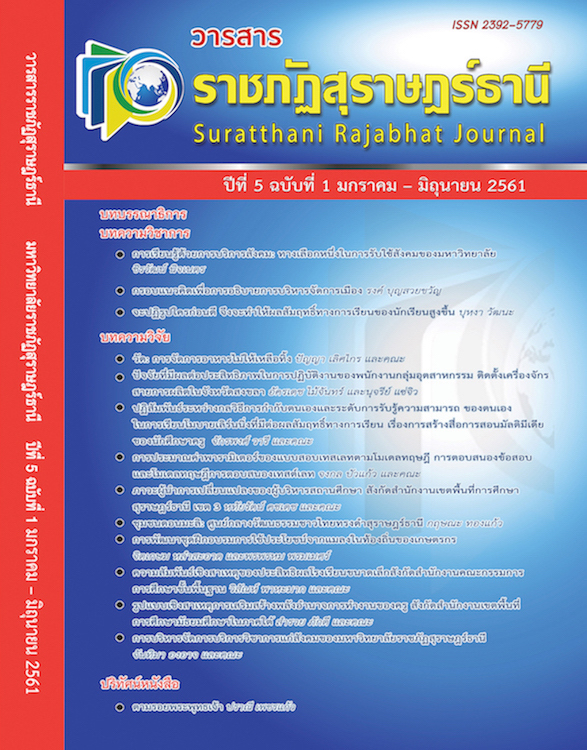Conceptual Framework for Explaining Politic Management
Main Article Content
Abstract
This research article has the objective to explain the power actors and factors or elements of city related to create the well-living city where local governmental organizations are as a mechanism in accountability for public services. This study was through interpretative synthesis of the phenomenon occurring in fields and literature reviews by improving phenomenon to principles or concepts concluding to conceptual framework for city management.
It found that there are five significant factors or actors and practices. Firstly, the administration has to change from government to governance, the administrative processes should be focused on change management with integrated administration and network management by sharing vision of the city. Secondly, elites or politicians who have to be the city management agent should emphasize on professional public services. Third, citizens have to be the moral citizen and the citizenship relevant to other sectors. Fourth, relationship between central and local government, it can influence to local autonomy in power practice for public services in cities through regulating, controlling and auditing, public service standards, human resources and budget management. Lastly, social capital of cities, which has been powerful in the former, should be reinstated and reconstructed such as social institution and social value system.
Article Details
References
โกวิทย์ พวงงาม. (2553). การจัดการตนเองของชุมชนและท้องถิ่น. คณะสังคมสงเคราะห์ศาสตร์ มหาวิทยาลัยธรรมศาสตร์.
คณะทำงานการปฏิรูปการกระจายอำนาจ. (2558). ที่ประชุมอธิการบดีแห่งประเทศไทย หรือ ทปอ.”.เอกสารข้อเสนอการปฏิรูปองค์กรปกครองส่วนท้องถิ่น ต่อสภานิติบัญญัติแห่งชาติ.
จรัส สุวรรณมาลา. (2547). นามานุกรมนวัตกรรมท้องถิ่นไทย ประจำปี 2547. กรุงเทพฯ : สำนักงานกองทุนสนับสนุนการวิจัย.
_______. (2538). ปฏิรูประบบการคลังไทย: กระจายอำนาจสู่ภูมิภาคและท้องถิ่น. กรุงเทพฯ : สำนักงานกองทุนสนับสนุนการวิจัย (สกว.) .
_______. (2539). การตรวจสอบผลการดำเนินงานกลยุทธ์ในการปรับปรุงการบริการภาครัฐ. กรุงเทพฯ : กราฟฟิค ฟอร์แมทไทยแลนด์.
ฉัตรทิพย์ นาถสุภา. (2529). บ้านกับเมือง. กรุงเทพฯ : สร้างสรรค์.
ชลธิรา ขุนทอง. (2560). เมืองในประวัติศาสตร์เศรษฐกิจไทย. ใน เพชรรุ่ง เทียนปิ๋วโรจน์ (บรรณาธิการ). ความเปลี่ยนแปลงทางเศรษฐกิจและสังคมไทยในปริทรรศ์ ประวัติศาสตร์ ศักดิ์โสภาการพิมพ์.
ชวน เพชรแก้ว และคณะ. (2556). ฐานเศรษฐกิจและทุนทางสังคมของอำเภอไชยยา. งานวิจัยในชุดโครงการการพัฒนาทุนทางสังคมภาคใต้เพื่อการพัฒนาที่ยั่งยืน ภายใต้โครงการเมธีวิจัยอาวุโสของ ศาสตราจารย์ชวน เพชรแก้ว. สนับสนุนโดยกองทุนสนับสนนุการวิจัย.
ณรงค์ บุญสวยขวัญ. (2556). ปัจจัยการแข่งขันทางการเมืองท้องถิ่น. เอกสารประกอบ การสอน วิชาการเมืองท้องถิ่น POS-239 หลักสูตรรัฐศาสตรบัณฑิต มหาวิทยาลัยวลัยลักษณ์.
รงค์ บุญสวยขวัญ. (2560). กรอบแนวคิดการวิจัยการบริหารการเปลี่ยนแปลง. วารสารอาศรมวัฒนธรรม มหาวิทยาลัยวลัยลักษณ์. ฉบับที่ 1 พ.ศ.2560
_______. “สาระการเมือง” การอธิบายแนวคิดสามารถสืบค้นได้ ใน Youtube
_______. (2557). ตัวชี้วัดการเมืองภาคพลเมืองในระบบประชาธิปไตยไทย. กรุงเทพฯ : สำนักงานเลขาธิการสภาพัฒนาการเมือง สถาบันพระปกเกล้า.
ธเนศวร์ เจริญเมือง. (2551). ทฤษฎีและแนวคิดการปกครองท้องถิ่นกับการบริหารจัดการท้องถิ่น. กรุงเทพฯ : คบไฟ.
นครินทร์ เมฆไตรรัตน์. (2551). กรอบแนวคิดและรูปแบบของการดำเนินงานร่วมกันเพื่อจัดทำบริการสาธารณะขององค์กรปกครองส่วนท้องถิ่น. ในกลยุทธ์ การวางแผนพัฒนาพื้นที่ท้องถิ่นเชิงบูรณาการ. โครงการความร่วมมือทางวิชาการระหว่างกรมส่งเสริมปกครองส่วนท้องถิ่นกับสถาบันการศึกษา.
พระราชบัญญัติกำหนดแผนและขั้นตอนการกระจายอำนาจให้แก่องค์กรปกครองส่วนท้องถิ่น 2542. (2542).
เอนก เหล่าธรรมทัศน์. (2546). การปกครองตนเอง. กรุงเทพฯ : คบไฟ.
_______. (2557). แปรถิ่นเปลี่ยนฐาน. กรุงเทพฯ : สำนักพิมพ์มหาวิทยาลัยธรรมศาสตร์.
_______. (2560). เมืองนิยม : เมืองของไทย บ้านของเรา. ศูนย์ศึกษามหานครและเมือง วิทยาลัยบริหารรัฐกิจ มหาวิทยาลัยรังสิต.
อนุสรณ์ ลิ่มมณี. (2557). รัฐ สังคม และการเปลี่ยนแปลง : การพิจารณาในเชิงอำนาจนโยบายและเครือข่ายความสัมพันธ์. กรุงเทพฯ : โรงพิมพ์เดือนตุลา.
อรทัย ก๊กผล. (2559). Urbanization เมื่อ “เมือง” กลายเป็นโจทย์ของการบริหารจัดการท้องถิ่นสมัยใหม่. วิทยาลัยพัฒนาการปกครองท้องถิ่น สถาบันพระปกเกล้า.
Donnelly, Andrew and Forrest, Beth. (2003). Cities, Medieval. In Karen Christensen and David Levinson (ed). Encyclopedia of Community. Sage Publications.
Denters, Bas. (2011). Local Governance. In Mark Bevir (eds). Governance. Sage Publising.
Eliassoph, Nina. (2013). The Politics of Volunteering. Polity Press.
Fukuyama, Francis. (2000). Trust : The Social Virtues and the Creation of Prosperity. Simon & Shuster.
Frishkin, James S. (2011). When the People Speak : Deliberative Democracy and Public Consultation. Oxford University Press.
Goldsmith, Stephen, Eggers William D. Governing by networking. (2552). แปลโดย จักร ติงศภัทิย์. การบริหารเครือข่ายภาครัฐ.
Keating, Michael. (1991). Comparative Urban Politics : Power and The City in The United States , Canada , Britain and France. Edward Elgar.
Leach, Steve, John Stewart and Kieron Walsh. (1994). The Changing Organization and Management of Local Government. London. Macmillan.
Lee, Thomas H., Shiba, Shoji, Wood, Robert Chapman. (1999). Integrated Management System : A Practical Approach to Transforming Organization. John Wiley & Sons.
McGuire, M. (2011). Network Management. Mark Bevire (ed). The SAGE Handbook of Governance. SAGE Publication.
Orum, Anthony M. (2003). Cities. In Karen Christensen and David Levinson (ed). Encyclopedia of Community. Sage Publications.
Putnam, Robert D. (2000). Bowling Alone: The Collapse and Revival of America Community. Simon & Shuster.
________. (1992). Making Democracy : Civic Traditions in Modern Italy. Princetion University Press.
Robinson, Tony. (2003). Cities, Inner. In Karen Christensen and David Levinson (ed). Encyclopedia of Community. Sage Publications.


